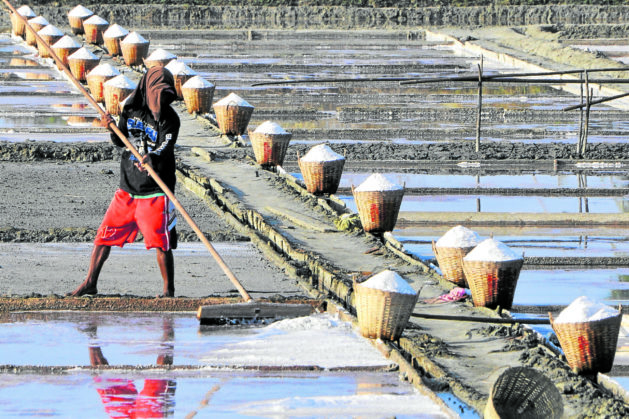Department of Agriculture pushes boost to salt making

Producing salt is no easy job, with workers, like this man in Dasol town in Pangasinan, spending long hours tending the salt beds, locally known as “banigan.” Salt crystals are collected and manually shoveled into large bamboo baskets and taken to a stockyard before these are cooked and processed. (Photo by WILLIE LOMIBAO / Inquirer Northern Luzon)
MANILA, Philippines — Despite being surrounded by salt water, the Philippines cannot even produce enough salt for its own needs because of government neglect over the past 15 years, according to Senior Agriculture Undersecretary Domingo Panganiban.
Panganiban, who was himself agriculture secretary for two previous administrations, said the Department of Agriculture (DA) is focusing its efforts on scaling up salt production.
“We have to produce salt to balance requests. We have [a] shortfall for industry and commercial uses,” Panganiban said in a text message.
Panganiban said early this week that the agency would work on bolstering local output to reduce the country’s dependence on imported salt and the government would have to earmark about P500 million to revitalize the salt industry.
“We can produce, but we don’t have a program for this. We’re importing. I don’t know the current volume but what I know is the salt produced from Batangas and Mindanao are small,” he said in a briefing.
Article continues after this advertisementEarly this month, Danilo Fausto, president of the Philippine Chamber of Agriculture and Food Inc., called for a significant budget for the local salt industry because the country sourcing 93 percent of its salt needs from abroad. “We are now importing almost a million tons of salt and we need this salt very badly.”
Article continues after this advertisement“We have 36,000 kilometers of shoreline. We only need 6 percent of that shoreline, we can already be self-sufficient in salt. We are importing 93 percent of salt from Australia and China,” he added.
Fausto also urged the government to review Republic Act No. 8172, known as An Act for Salt Iodization Nationwide (Asin), to provide the much-needed boost to the salt sector and its producers.
“I think we should take a look at this. In the proposed budget, not a single centavo is allocated to salt,” he said.
In the House of Representatives, Kabayan Rep. Ron Salo also filed House Bill No. 1976 to revitalize the salt industry.
“The Philippines used to be salt self-sufficient. Today, it is a huge importer of salt. Import is estimated at around 550,000 metric tons of salt every year which constitutes around 93 percent of the country’s salt requirement. This is ironic considering that the Philippines has 36,000 kilometers of shoreline—the fifth longest shoreline in the world—which can be utilized for massive salt production,” Salo had said.
The proposed law called for the establishment of the Administration for Salt Industry Development, Revitalization and Optimization, with the Department of Agriculture and the Department of Trade and Industry co-leading the interagency body.
RELATED STORIES
COVID brings Pangasinan town’s salt industry to a standstill
Ilocos salt industry losing its savor